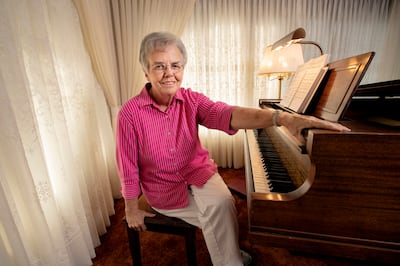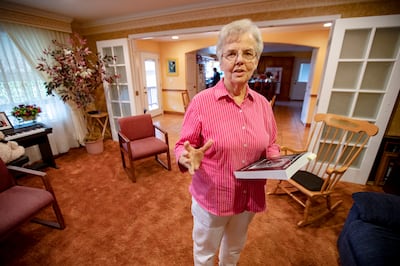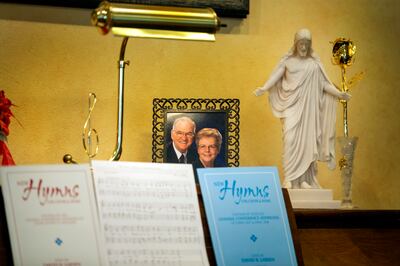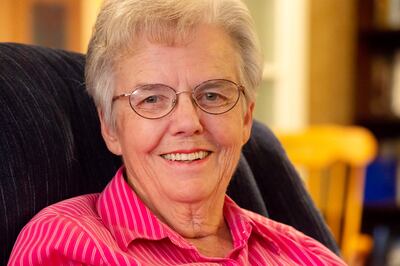PROVO — Janice Kapp Perry, surely the most prolific songwriter in the history of The Church of Jesus Christ of Latter-day Saints and composer of so many of the church’s most beloved songs, turned 80 this week.
Her left hand is partially paralyzed and almost useless at the piano, the tool of her trade.
Her husband, Doug Perry, the man who facilitated her career and was the impetus behind much of her work, passed away in July after almost 60 years of marriage.

Her once flourishing family music business was stymied years ago by a dramatically shifting market and economy.
But every day she reports for work.
She shuts herself in her home office in the back of the house — a converted garage — as she has for four decades and goes about the business of writing and composing with sober determination.
“This is where I live my life,” Perry says.
Like so many others of her faith, Perry celebrated this year’s announcement by the church that it will revise its hymnbook for the first time since 1985 and accept submissions to consider for new hymns. There’s just one caveat that cut short her joy: Each composer will be limited to five submissions.
“I can’t choose five,” she says. “How am I going to do that?”
For Perry, it’s like having to choose a favorite child. She has written well over 2,000 songs, and 320 of them are classified as hymns. She will be able to circumvent the limit by submitting songs through various collaborations — she co-wrote two hymns with Elder Neal A. Maxwell and one with former church President Gordon B. Hinckley and dozens with David Larsen, John Pearson, Rodney Turner, Bonnie Hart Murray and Sen. Orrin Hatch. But even at five songs per collaboration, it represents a fraction of her work.
“This is such a big deal now in the church,” Perry says. “Everyone is talking about it everywhere I go. We’re all thrilled. Everyone in the music business has wanted a new hymnbook. It’s been 33 years between editions. I’d say one-third of the hymns are rarely or never sung; they never caught on. This is a whole new day.”
It is a massive undertaking. According to the church website, some 6,000 original songs were submitted for the current 1985 edition of the hymnbook, when the church’s membership was 6 million to 7 million. The church now has more than 16 million members, and they have been submitting 500 to 700 original songs annually.

“They might have opened a can of worms when they invited everyone in the world,” Perry says. “For other editions, they didn’t open it to everybody. People who don’t write music are submitting. This is wonderful, but it will create a big job for those making the decisions.”
Perry didn’t begin writing hymns until late in her career, some 15 years ago, and then only because of her late husband. One day, as they were driving from Idaho to their Provo home with Perry reclined in the passenger seat, her husband suddenly declared, “I feel a strong impression that you should write 100 new hymns.” Perry sat up in her seat.
“One hundred!?” she said. “Why not try writing one hymn first; they’re not easy, you know.”
“I’m just telling you my impression,” he said. “Take it or leave it.”
She has more than tripled her husband’s challenge. She was amused after reading a newspaper article in which the writer stated that no one was writing new hymns for the church anymore. “It made me smile,” she says. “That has been my focus for three decades.”
She and Larsen have written 47 hymns alone that were inspired by the sermons of Elder Jeffrey R. Holland in the church’s biannual general conference. They also have written hymns for every sermon given by the church’s First Presidency and apostles at the last two general conferences — 30 in all. All of the above are published in books titled “Inspirational New Hymns for Choir & Home.” But none are in the church’s hymnal, yet.
“Since my husband passed away I haven’t had the heart to write anything,” she says. “I know it will come back. I’ve got to write 15 more new hymns inspired by the (October 2018) general conference.”
Perry grew up in a musical family on an Oregon farm. Her parents, Jacob and Ruth Kapp, performed in the Kapp Dance Band. Their children sang in a quartet accompanied by their mother on piano. “We had a lot of music in our home,” recalls Perry, who played drums and piano. “There was lots of singing.”
Her sister Ann Kapp Andersen has arranged and recorded 12 piano solo albums of Perry’s music. Her brother, Gary Kapp, is a painter whose work is displayed in church temples and magazines. Her late brother, Jack Kapp, an engineer who worked on the Space Shuttle program for Morton Thiokol, sang in barbershop quartets.
At BYU, Perry studied music theory and composition and played in the school concert band and orchestra, but after the university and starting a family, she discovered something she loved more than music. For the next 20 years she played sports — church- and city-league softball, volleyball and racquetball — until she broke an ankle in 1978 during a pickup game on the basketball court. The family TV was broken, as well, and she had little to do while recovering from the injury until her local bishop asked her to write original music for a road show. It was a neighborhood hit and that began her songwriting career.
Since then, she’s recorded about 900 songs spread among 105 albums of various collaborations with other writers and in three other languages. Her work also includes nine cantatas and two full-length musicals.
Her simple, melodic songs are favorites in the church — “Love Is Spoken Here,” “I Love to See the Temple,” “We’ll Bring the World His Truth,” “I’m Trying to Be Like Jesus,” “A Child’s Prayer,” “Where Is Heaven?” “(I Belong to) the Church of Jesus Christ.”
President Russell M. Nelson, who was one of the church’s apostles at the time and is now the church’s president, once sought her out at a luncheon in the 1980s to tell her that her music had a place beside the scriptures in his home. “That was so encouraging for me,” she recalls. “It was the impetus to continue.”
Ten of her songs are in the church’s primary songbook for children. Only one of her songs is included in the hymnbook — “As Sisters in Zion,” written in 1985. She doesn’t consider it a hymn. Instead of the requisite four-parts (soprano, alto, tenor, bass), it’s a duet — two parts.
Church officials gave her three verses of a poem written by pioneer Emily H. Woodmansee, who died in 1906, and asked her to set it to music for the 1985 edition of the hymnbook. That established her approach to the genre. Kapp wrote both lyrics and music for almost all of her music until she ventured into the arena of hymns; it was then that she turned almost exclusively to writing music for lyrics written by others — namely, Turner, Pearson, Larsen and Murray.
She has collaborated with others on rare occasions as fate — or providence, she would say — dictated. In 2007, Perry was visiting her dying niece, Kathy Blacker, when she saw a poem on the wall above her bed — “What Is This Thing Men Call Death,” a poem written by President Hinckley. Blacker had written to President Hinckley to ask if the poem could be printed on the back of her funeral program. In his reply, he offered permission and solace.
“He wrote her the most comforting letter,” says Perry. “She said she was ready to go with his help.”

Blacker urged Perry to put the poem to music. Perry wrote to President Hinckley asking for permission to set it to music and to publish it. He replied immediately and gave her permission, but only if he could hear it before it was published. When she finished the hymn in December 2007, she sent a copy of the hymn to the church president, but this time she didn’t receive an immediate reply.
Blacker, who was able to hear the hymn performed on piano by her mother, died of cancer weeks later. Perry was still waiting for a reply from President Hinckley when she was informed that he had died — on Jan. 27, just 16 days after Blacker. She was saddened by his passing and regretted that she hadn’t received permission.
The next morning, her son brought her a letter he had retrieved from the mailbox and said, “Is this the letter you’ve been waiting for?” It was the letter from President Hinckley saying that he liked the hymn and that she had permission to publish it.
He had dictated the letter on Friday and it had been mailed on Saturday. He died on Sunday and the letter arrived on Monday.
“It was the most amazing experience I’ve had with a hymn,” she says. On that Tuesday, Craig Jessop, director of the Mormon Tabernacle Choir at the time, called to inform her that President Hinckley’s family had requested that the choir sing the hymn at his funeral.
“They did a beautiful slow version of it,” says Perry. “I was so happy that my few bars of music could be part of the tribute to this marvelous man.”
If there’s another of Perry’s hymns that will probably be given serious consideration for the revised hymnal it will be “I Will Come Unto Christ,” her collaboration with Turner, a former BYU ancient history professor who died a few years ago. He approached Perry with a poem he had written for his wife’s birthday and asked if she would set it to music. It became the first true hymn that Perry wrote.
A week after completing the composition, she departed on a group tour of the Holy Land that was led by Turner. As the group sat on the Mount of Beatitudes overlooking the Sea of Galilee, she taught the hymn to her fellow tourists with the help of a recording she had made of the hymn, and they sang it together. The hymn wound up winning first prize at the church music contest.
“That’s the one I most hope to get in the hymnbook,” says Perry, whose ward at that time pasted the hymn on the inside cover of the hymnbook with the blessing of the bishop. It has been arranged and published for choirs since then.
Among Perry’s other collaborations that have already found audiences: “I Marvel at the Miracle” and “I Testify of Christ” — lyrics by Pearson; “Should the Savior Ask, Do You Love Me?” — lyrics by Larsen. She also has written and published 28 hymns with Murray in which the texts are taken almost verbatim from the Book of Mormon, the most popular of which is “An Angel With a Trump of God.”
The hallmark of Perry’s music — aside from melody — is its simplicity, which is intentional; church officials have encouraged musicians to make it playable for the masses. There are few complex chords and keys, and few big octave stretches. This simplicity proved convenient and necessary for Perry because of her painful and partially dysfunctional left hand, which has defied a remedy after visits to dozens of doctors.
As a result, she writes much of the song in her head — no small feat — to minimize time at the piano.
If nothing else, it reflects the stubborn persistence and determination that has seen her through a number of other challenges.
After years of struggling to build a family business around Perry’s work — Doug Perry quit his job as a data processor to devote himself full-time to her work — they formed Prime Recording and became a successful business, collecting royalties and selling recordings, songbooks and sheet music in various music stores. But in 2001 they began to feel the effect of a changing market wrought by digital recordings, a problem that was compounded by the economic crash in 2008. Stores stopped selling music and the family had to revamp its business model and sell music books and music on its own website and various download sites. They have never recovered their former level of sales.
“Until then, we had been able to do whatever project we needed to do because the last one financed it,” says Perry.
She has continued to work full days, compelled by her faith and her belief in the power of music, spending long hours every day in that backroom office.
“That’s where she usually is in the house, working at the piano or her desk,” says her son John Perry, who manages the business. “Or she sits in there in her recliner and writes lyrics or thinks about things. She’s just going all the time. She’s in there all day.”

She is still driven and goal-oriented. She hands her son a to-do list for music projects, explaining, “Here are some things I need to get done.” Says John Perry, “She makes lists and then gets them done.”
The only breaks she takes are brisk walks, visits with friends, taking in a session in the temple near her home, and indulging in a Hallmark movie or a sports event on TV. She talks about Utah Jazz and BYU games knowledgeably enough to serve as a TV color commentator (“Nobody’s asked,” she says).
It’s exhausting to contemplate the work this small woman has accomplished in 80 years. She has raised four children and housed 10 foster children, played sports for two decades, given hundreds of speeches and firesides, served a church mission in Chile with her husband, written more than 2,000 songs, recorded more than 100 albums, sung in the Mormon Tabernacle Choir for five years, published scores of music books, written musicals and cantatas and, with the help of others, produced a traveling musical — “It’s a Miracle” — that was performed 239 times around the nation. She has been the subject of a documentary and the recipient of several awards honoring her work.
“I’ve got to do some fundraising,” she says. “I want to get everything wrapped up while I’m still in good health. With the way the music business has gone, I’ll need help from a donor so I can finish some projects and recordings. I want to get everything online so it will be available and people can go there and hear it and buy it and download it. I want to catalogue everything. Otherwise, things will be lost. The BYU library is working with me to preserve all my papers and memorabilia in their special collections section.”
She pauses and then her thoughts turn to her raison d’etre.
“Writing hymns has really been the culminating effort of my life. I won’t be here for the next edition of the hymnal, but I’d love to have a hymn or two of mine in there to live on.”

















